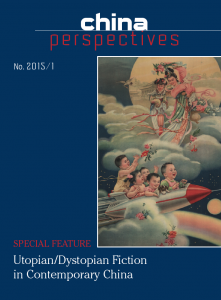
China Perspectives 2015/1
SPECIAL FEATURE
Utopian/Dystopian Fiction in Contemporary China
- Special Feature
- Article
- Book Reviews
Jeffrey C. Kinkley, Visions of Dystopia in China’s New Historical Novels
Jean-Pierre Cabestan, Le système politique chinois. Un nouvel équilibre autoritaire (The Chinese Political system: A new authoritarian balance)
Kirk A. Denton, Exhibiting the Past: Historical Memory and the Politics of Museums in Postsocialist China
Nancy Bernkopf Tucker, The China Threat: Memories, Myths, and Realities in the 1950s
Chien-wen Kou and Xiaowei Zang (eds), Choosing China's Leaders
Mylène Gaulard, Karl Marx à Pékin - Les racines de la crise en Chine capitaliste (Karl Marx in Beijing: Roots of crisis in Chinese capitalism)
Book Reviews (PDF version)
Voting shift in the November 2014 local elections in Taiwan: Strong rebuke to Ma Ying-jeou's government and policies and landslide victory for the DPP
Hong Kong After the Umbrella Movement: An uncertain future for “One Country Two Systems”
Social Media and Collective Remembrance: The debate over China’s Great Famine on weibo
ABSTRACT: This paper provides one of the first studies on the role of social media in articulating individuals’ experiences and memories and (re-)shaping collective memory in contemporary China. It investigates how social media enable and facilitate the participation of ordinary citizens in distributing and accumulating alternative narratives and memories of the past against the authoritarian version by taking the debate over China’s Great Famine – a topic long considered a political taboo – on Sina Weibo, one of the country’s most popular social media sites, as the case study. This study demonstrates that weibo provides people with an alternative communicative sphere for sharing previously suppressed, marginalised, “unofficial” memories as civil disobedience and accumulating them into an alternative collective memory that is relevant to the changing socio-political context of China.
KEYWORDS: Collective memory, social media, alternative narrative, China, weibo, the Great Famine.
Society and Utopia in Liu Cixin
ABSTRACT: This article examines utopianism in contemporary China through the short stories “Taking Care of God” and “Taking Care of Humans” by best-selling science fiction author Liu Cixin. It argues that these stories constitute an ethical resistance to the shortcomings of the capitalist world order into which China has merged during the reform period. Read as a continuation of the modern Chinese utopian tradition as well as a reaction to contemporary trends, these stories offer an articulation of hope that a more just social order can yet be achieved despite the seemingly intractable problems facing the world today.
KEYWORDS: utopia, dystopia, science fiction, reform era, globalisation, capitalism.
Dreamers and Nightmares: Political novels by Wang Lixiong and Chan Koonchung
ABSTRACT: Wang Lixiong’s Yellow Peril (1991) represents the return of political fiction of the future not seen in China for decades. Chan Koonchung’s The Fat Years (2009) brings the imagination to a full dystopian vision. Reading the two novels side by side, this paper argues that Chinese fiction of the future in the early 1990s responded to the country’s struggle for direction when the bloody crackdown of the Tiananmen protest wiped out collective idealism in society. In the twenty-first century, such fiction is written in response to China’s rapid rise as one of the world’s superpowers, bringing to domestic society a seemingly stabilised order that has deprived it of intellectual vision.
KEYWORDS: Political novel, dystopian literature, Wang Lixiong, Chan Koonchung, Yellow Peril, The Fat Years.
Blanks to be Filled: Public-Making and the Censorship of Jia Pingwa’s Decadent Capital
ABSTRACT: Jia Pingwa’s Decadent Capital was wildly popular upon its publication in 1993. Offering plenty of sex and a bleak view of Chinese society under reform, it was also highly controversial, not least because of the blank squares strewn throughout the text to represent erotic descriptions edited out by the author. Commentators accused Jia of selling out high culture, much like the intellectuals portrayed in the narrative. The novel was banned in 1994 but rereleased in 2009 with one major change: the blank squares were replaced by ellipses. I argue that these blank squares not only make public censorship itself but also constitute the space of alternative publics, whether harking back to an elided past or projecting into a future yet to be written, that the post-Tiananmen Party-state tries to nullify.
KEYWORDS: Jia Pingwa, censorship, publishing industry, postsocialism, dystopia, utopia, Tiananmen Square, public, criticism, Lu Xun.
After 1989: The New Wave of Chinese Science Fiction
ABSTRACT: This paper examines the new wave of Chinese science fiction as both a subversion and variation of the genre’s utopianism of the earlier age. Wang Jinkang’s Ant Life (2007), Liu Cixin’s China 2185 (1989), the Three-Body Trilogy (2006-2010), and the short story “The Micro-Era” (1999) are the main texts this paper studies. Their reflections on utopianism speak to the post-1989 changing intellectual culture and political economy. This paper argues that the new wave of Chinese science fiction contains a self-conscious effort to energise the utopian/dystopian variations rather than a simple denial of utopianism or a total embrace of dystopian disillusionment, and this is particularly represented in Liu Cixin’s novels. The paper also provides some preliminary thoughts on the vision of a post-human future depicted in Liu Cixin’s science fiction.
KEYWORDS: Science fiction, new wave, utopia/dystopia, post-humanity, Liu Cixin, Three-Body Trilogy.


